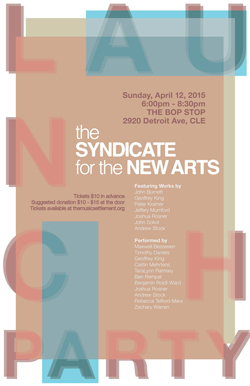by Mike Telin

Formed at Oberlin College and Conservatory, The Syndicate is committed to championing the works of living composers, especially those who are based in the Rust Belt. In an interview with ClevelandClassical.com, Syndicate founder and executive director Joshua Rosner said, “The launch is really about getting all of the composers and performers together with the audience… After the concert we’ll open things up for a huge party so that everyone will have the chance to get to know each other.” Rosner’s hopes for the event were certainly met. It was a tremendous success on every level.
First and foremost, the evening was about the music, and the eight compositions featured on the program represented an eclectic mix of musical styles and instrumentation written by students and recent graduates as well as by established composers in the area. Given that none of the pieces lasted more than ten minutes, it was easy to stay engaged with all that was happening on the Bop Stop stage.
The evening began with John Sokol’s Vermillion, performed by Max Bessesen (saxophone) and Ben Rempel (drum set). Full disclosure: due to a reviewing commitment earlier that afternoon, I arrived just after the performance of this work had been completed.
Jeffrey Mumford’s Three Short Duos for Violin and Harp is an enchanting kaleidoscope of sound. The performance of the engaging work by harpist Caitlin Mehrtens and violinist Rebecca Telford-Marx was full of nuanced expression.
Soprano Ann Sauter and pianist John Etsell followed with Geoffrey King’s arresting Buckley Songs. From the first word, Sauter’s impeccable diction brought the texts of poet Logan Buckley vividly to life. Her dramatic delivery of the spoken words “I have fallen short” in the third song was striking. Etsell provided well-balanced and sensitive support throughout.
The first half concluded with an impressive account of Peter Kramer’s Lucet Aurora by violinist Tara Lynn Ramsey and violist Andrew Stock. A physical work full of sudden starts and stops, it places many technical demands on the players, both of whom were up to the challenge as they threw fast-moving musical lines back and forth at each other.
Following a short break to refill drinks and to order something from the menu (created especially for the event by the Bop Stop chefs), the second half kicked off with Andrew Stock’s Preshus Music for solo viola, performed by the composer. Playing from memory, Stock brought passion and technical flair to his improvisatory-sounding piece.
John Burnett’s Astria for oboe and electronics, performed by Burnett and oboist Tim Daniels, is a striking eight-minute work that inventively melds the acoustic and electronic worlds into one. Burnett and Daniels were adroit collaborators while creating the illusion that the electronics were growing out of the oboe’s focused, woody sound.
Joshua Rosner’s Sindoor — a trio for bassoon, trombone, and electric guitar — is an affable seven-minute set of variations that explore a variety of soundscapes and moods. Beginning with breath sounds, bassoonist Ben Roidl-Ward and trombonist Zachary Warren set a quiet tone that subtly grew in volume, while the composer himself added pointed sounds of color on electric guitar. A high gurgle in the trombone and a dramatic unison thump brought the piece to a conclusion.
Geoffrey King’s engaging performance of Jessie Downs’s jazz-infused Variations for solo piano enjoyably capped the musical portion of the evening.
It was great to see so many people staying around to say hello and give heartfelt congratulations to all of the composers and performers. Once again the Bop Stop was the perfect location for an event designed to bring people together — hopefully the first of many events to come.
It seems that Joshua Rosner and his Syndicate for the New Arts colleagues have entered into uncharted territory when it comes to bringing composers, performers and lovers of new music together in a club that has great acoustics as well as great food, drinks, and a friendly atmosphere. The possibilities for future performances are endless.
Published on ClevelandClassical.com May 4, 2015.
Click here for a printable copy of this article



